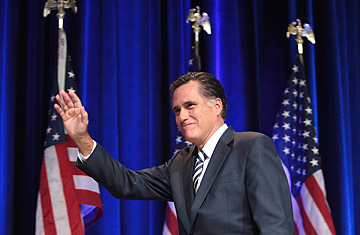
Many of us caught our last glimpse of Mitt Romney in the winter of 2008, when his presidential campaign was sputtering to a close, dogged by the perception that the former Massachusetts governor was a shape-shifting candidate with a focus-grouped platform. Since then, as potential 2012 primary rivals like Sarah Palin and Mike Huckabee took Fox News gigs and stayed in the public eye, Romney has quietly receded from the spotlight. But his new book, No Apology: The Case for American Greatness, leaves little doubt that he's spent the time away rebooting his message in preparation for an Oval Office bid. In No Apology, which hit stores March 2 and dovetails with a two-month publicity blitz, the former Massachusetts governor drops the social conservative shtick, preferring to focus on his managerial bona fides and the Obama Administration's missteps.
The book's title is an allusion to Obama's American Apology Tour, Romney's catch-all phrase for the president's habit of copping to perceived (or actual) U.S. shortcomings. "Never before in American history has its president gone before so many foreign audiences to apologize for so many American misdeeds, both real and imagined," he writes. "There are anti-American fires burning all across the globe; President Obama's words are like kindling to them." It's tempting to dismiss the section on foreign policy as an attempt to see how many different formulations Romney can use to profess his belief in American exceptionalism. But the theme is at the heart of the contrast Romney draws between himself and the president: while his prescriptions are designed to preserve American supremacy, Obama espouses American equivalence. "If the president accepts that America is in an irreversible state of decline relative to the world, it may well come to pass under his stewardship," Romney warns.
It's a dangerous perspective, Romney argues, at a time when China's clout is growing, Russia is resurgent and the U.S. remains mired in a grinding war with Islamic extremists. "The truth is that we are at war with a formidable enemy and that nations like Russia and China are intent on neutralizing our military lead," Romney writes in support of maintaining healthy defense budgets. "We must pay a large price to maintain our freedoms, and if we do not pay enough in dollars, we may be forced to pay the price in blood." He also charges — somewhat incongruously — that "it is long past time for America to strengthen and effectively deploy our soft power," which is, of course, partly what Obama is trying to do by toning down the Bush Administration's rhetoric.
The Harvard MBA and venture capitalist is sharper when it comes to the economy, a topic squarely in his wheelhouse. The best way for government to stimulate the economy, he argues, is to promote a favorable climate for innovation and then get out of its way. But he's not an absolutist when it comes to government meddling in the markets. Though he denounces the bailout of Detroit carmakers, Romney is a backer of TARP, though he couches his position with a caveat that protects his right flank. "Secretary Paulson's TARP prevented a systemic collapse of the national financial system," he writes. "Secretary Geithner's TARP became an opaque, heavy-handed, expensive slush fund. It should be shut down."
His support of Wall Street — and his statement that the rise of populism is an understandable but "worrisome" response to a sagging economy — is telling. Unlike Palin, whose book Going Rogue was an anecdote-laced grand tour of her household, Romney has penned a sober, substantive tome that traces the decline of the Ottoman Empire and includes graphs of housing prices. With voters consumed with their checkbooks, he ramps up the wonkishness, offering an Index of Leading Leading Indicators and closing the book with a 64-point agenda on issues ranging from tort reform and the construction of nuclear power plants to hiking teacher pay and appointing strict constitutionalists to the bench. No Apology is Romney's attempt to position himself as the business-savvy candidate economic conservatives can coalesce behind, which isn't a bad tactic. Still, he's now given his opponents, both known and still unknown, a peek at his campaign playbook. When you're likely to meet your rivals down the road, that can be a risky move.
